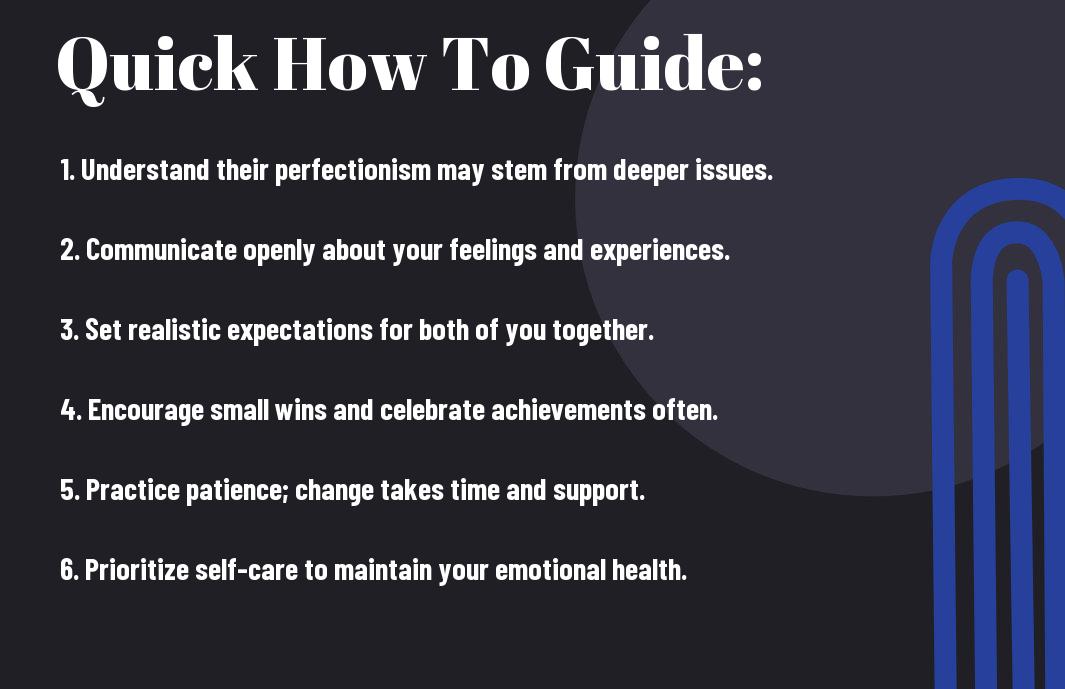This guide will provide you with effective strategies for navigating the complexities of dating someone who has perfectionist tendencies. Understanding your partner’s perspective is key, as their drive for excellence can impact your relationship in various ways. You’ll learn how to communicate openly, set realistic expectations, and foster a supportive environment that encourages both personal growth and mutual understanding. With the right approach, you can create a fulfilling partnership that balances your needs and their aspirations.
Understanding Perfectionism
To navigate a relationship with a perfectionist, it’s important to understand the nature of perfectionism itself. This trait often manifests as an intense desire for flawlessness in thoughts, actions, or outcomes. Perfectionists set exceedingly high standards for themselves and others, leading to a relentless pursuit of what they deem ideal. Recognizing and acknowledging these tendencies is the first step in fostering a supportive dynamic in your relationship.
Defining Perfectionism
To define perfectionism, you should see it as a mindset characterized by the belief that anything less than perfect is unacceptable. This often involves a fixation on details and an overwhelming fear of failure. For your partner, this drive can create immense pressure, pushing them to constantly evaluate and improve every aspect of their lives.
The Impact of Perfectionism on Relationships
Little do many realize, perfectionism can significantly strain relationships. It may manifest as unrealistic expectations, making it difficult for you or your partner to feel satisfied. Their internal standards might lead to frustration, both for them and for you, creating a disconnect that can be challenging to bridge.
Another way perfectionism impacts relationships is through communication barriers. When one partner is fixated on achieving their ideal, they may struggle to express vulnerabilities or shortcomings, fearing judgment or disappointment. This can hinder emotional intimacy, leaving you feeling isolated or unappreciated. Addressing these dynamics openly and compassionately is important for cultivating a healthier and more understanding relationship.

Recognizing the Signs of a Perfectionist Partner
Some individuals believe that the pursuit of perfection enhances their relationships, yet it often leads to dissatisfaction. If you notice that your partner frequently feels disappointed with their own performance or criticizes themselves harshly, these could be signs of perfectionism. You should also pay attention to how they handle criticism and setbacks, as these responses often reveal deep-seated perfectionist tendencies.
Behavioral Indicators
For perfectionists, their behavior may be characterized by an obsession with details and an inability to delegate tasks. You might find that your partner feels overwhelmed by expectations, both self-imposed and those they think others have of them. They may also struggle to enjoy experiences, as they often focus more on the outcome than the process.
Emotional Responses
The emotional landscape of a perfectionist can be complex. You may notice your partner displaying anxiety or frustration, particularly when things don’t go as planned. Their self-esteem might appear tethered to achieving their high standards, causing them to be overly critical not only of themselves but also of others. This can lead to feelings of inadequacy when they fall short of their expectations.
With the constant pressure to meet unrealistic standards, perfectionists often experience a rollercoaster of emotions. You might see them swing from high hopes to deep disappointment as they grapple with not meeting their ideals. These emotional highs and lows can impact your relationship, making communication and understanding crucial as you navigate these challenges together.
How to Communicate Effectively
Many people struggle with communication, especially when dating someone who is a perfectionist. It’s important to establish a channel where both you and your partner feel comfortable expressing thoughts and feelings. Honest, respectful, and clear communication can help bridge the gap between perfectionist tendencies and realistic expectations in your relationship.
Tips for Open Dialogue
Clearly, sharing your perspective openly fosters understanding. Here are some tips for facilitating open dialogue:
- Use “I” statements to express your feelings without sounding accusatory.
- Encourage your partner to share their thoughts and feelings openly.
- Stay calm and patient, ensuring a supportive environment for discussion.
- Schedule regular check-ins to keep communication flowing.
Assume that your partner values your input and will appreciate your efforts to communicate effectively.
Addressing Concerns Without Conflict
With a perfectionist, addressing concerns can feel daunting, but approaching the conversation tactfully is key. Be mindful of their sensitivities and frame issues as opportunities for growth rather than criticisms.
To ensure a constructive dialogue, focus on the specific behavior or situation at hand rather than making sweeping generalizations. This not only minimizes defensiveness but also fosters collaboration in finding a solution. Additionally, you might want to validate your partner’s feelings before presenting your concern. By doing so, you create a safe space where both of you can explore difficult topics without escalating tension or conflict in your relationship.
Setting Realistic Expectations
For you and your perfectionist partner, it’s important to establish realistic expectations in your relationship. Open communication about each other’s needs and desires will help prevent misunderstandings. By acknowledging that nobody is perfect, you can create a safe space to express your feelings without the pressure of unrealistic ideals. This dialogue is important for maintaining a healthy balance and fostering mutual understanding.
Embracing Imperfection
To cultivate a more accepting atmosphere, embrace the concept of imperfection. Recognize that flaws are a natural part of life and relationships. This mindset shift can lighten the emotional load for both you and your partner, allowing you to appreciate the beauty in each other’s unique traits and quirks. By celebrating imperfections, you foster a deeper connection rooted in authenticity.
Finding Common Ground
Some of the best ways to navigate your relationship with a perfectionist is to find common ground. Identify situations where both of your expectations align or where compromises can be made. You might love spontaneity, while your partner values planning—figure out ways to blend these preferences for a more harmonious dynamic. Establishing this common ground can enhance your connection and build a sense of teamwork.
It helps to set aside specific time to explore activities together that allow both of you to contribute your strengths. For example, while planning a weekend getaway, you can take charge of selecting fun activities, while your partner manages the logistics. This way, you both feel involved and valued, creating a balance that fosters overall compatibility. Finding these points of agreement encourages collaboration, making the relationship stronger and more enjoyable for both of you.
Supporting Your Partner
Unlike other relationship dynamics, dating a perfectionist may require you to be more conscious of how you offer support. It’s vital to provide understanding and encouragement while helping your partner navigate their high expectations. This balance will foster a healthier dynamic, enabling growth for both of you, as you become a reliable source of comfort amidst their internal pressures.
Encouraging Healthy Perspectives
Now is the time to help your partner shift their mindset about perfectionism. Encourage them to embrace progress over perfection by highlighting the value of effort and growth. Share your experiences of overcoming challenges, emphasizing that mistakes are a natural part of life. This perspective can help your partner develop a healthier relationship with their goals.
Balancing Support with Self-Care
To effectively support your perfectionist partner, it’s vital to maintain your own well-being. Balancing your support with self-care ensures you have the emotional resources to help them. Set clear boundaries around your availability, and regularly engage in activities that replenish your energy. By taking care of yourself, you can provide your partner with the encouragement they need without compromising your own mental health.
Encouraging a healthy balance between supporting your partner and prioritizing your self-care can significantly enhance your relationship. Engage in regular discussions about your individual needs and establish a routine that accommodates both your well-being and your partner’s. Consider setting aside specific times for self-reflection or hobbies to recharge your emotional batteries. Prioritizing these moments will not only benefit your mental health but also strengthen your ability to be there for your partner effectively.

Navigating Challenges
All relationships face hurdles, and dealing with a perfectionist partner can introduce unique challenges. To maintain harmony, it’s necessary to foster open conversations about expectations and feelings. Help your partner understand the impact of their standards on your relationship. Additionally, equip yourself with strategies to tackle these challenges together. For more insights, check out If you have a spouse who is a perfectionist and hardly ….
Coping Strategies for Stress
Little changes can make a big difference when you’re feeling overwhelmed by your partner’s perfectionism. Prioritize self-care activities that help you relax and recharge, such as exercise, meditation, or hobbies. Create a support system of friends or family members who understand your situation, allowing you to express your feelings openly without judgment. These strategies can provide the emotional cushion you need during challenging times.
When to Seek Professional Help
While it may feel daunting, recognizing when to seek professional help is important for your mental well-being. If the stress associated with your partner’s perfectionism becomes overwhelming or starts to impact your self-esteem and happiness, it’s worth considering therapy. A professional can offer valuable tools and perspectives that can help you navigate your relationship more effectively.
When seeking professional help, it’s beneficial to approach the topic with an open mind. Therapy can create a safe space to explore your feelings, improve communication, and establish boundaries, benefiting both you and your partner. Engaging a counselor or therapist who specializes in relationship dynamics can facilitate those conversations and provide strategies tailored to your specific circumstances, promoting healthier interactions over time.
Final Words
Hence, navigating a relationship with a perfectionist requires patience, understanding, and open communication. By acknowledging their need for high standards while setting healthy boundaries for yourself, you can create a balanced dynamic. Encourage their strengths but also gently remind them that imperfection is a natural part of life. Celebrate small victories together and approach challenges as a team. Ultimately, your willingness to adapt and support your partner can foster a deeper connection and mutual growth.









